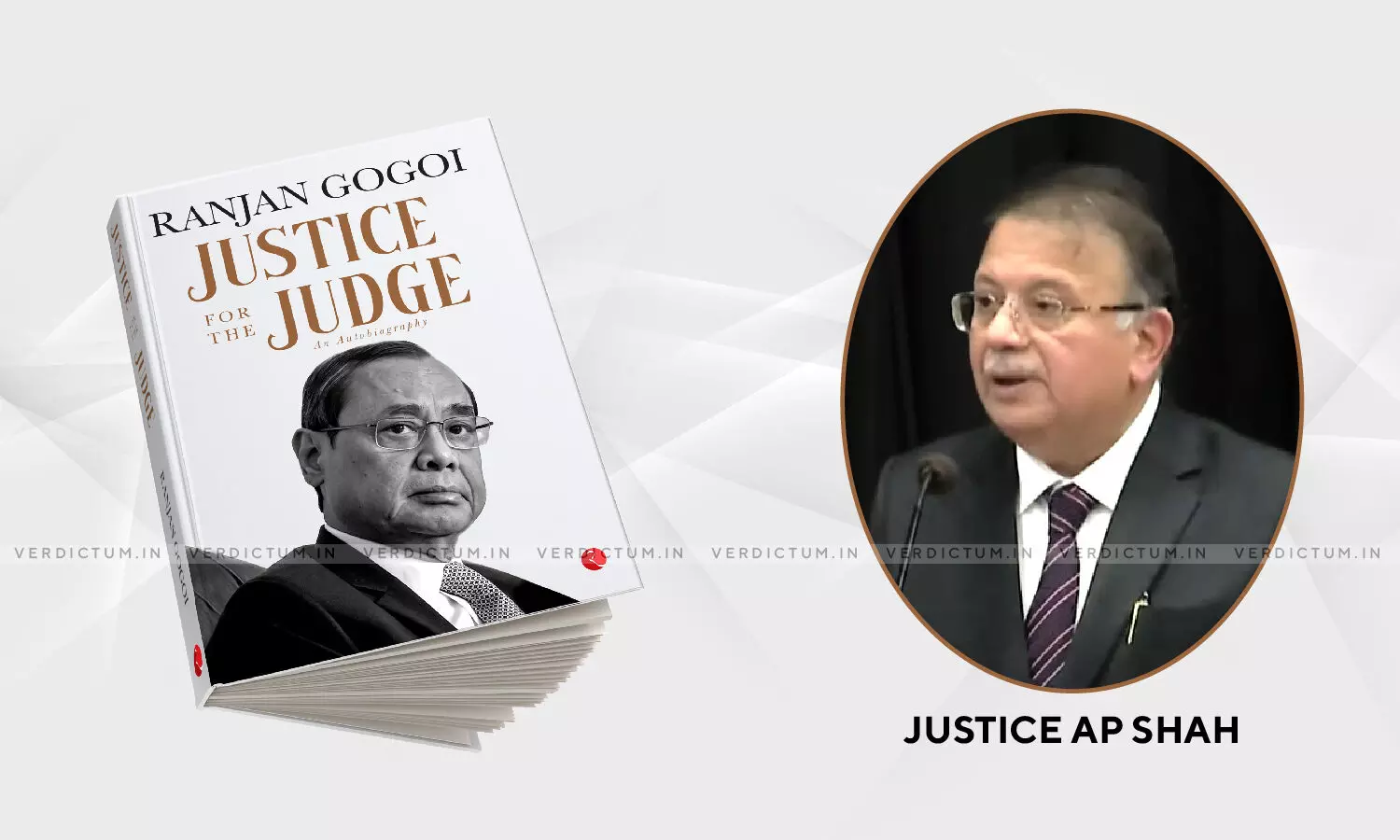
Sheer Hypocrisy: Justice Gogoi On The Stand Of Justice A. P. Shah On In-House Inquiry Procedure
 |
|In his autobiography, Justice For The Judge, Ex-CJI Justice Ranjan Gogoi has commented on the stand of Justice A.P. Shah, a former Chief Justice of the Delhi High Court on the matter of in-house inquiry procedure followed by the Supreme Court on allegations of misconduct against Judges.
"What is shocking and mind-boggling is the sheer hypocrisy and selective outrage as the facts below would indicate", Justice Gogoi writes in the book while analysing the stand of Justice Shah.
Justice Gogoi notes that Justice Shah had expressed strong reservations about the in-house proceedings initiated by the Supreme Court in the matter of the allegations of sexual harassment against Justice Gogoi by a Supreme Court staffer during a lecture delivered by him.
Justice Shah, while delivering the 27th Rosalind Wilson Memorial Lecture in July, 2019, had criticised the actions of the Supreme Court in the matter of the allegations against Justice Gogoi, while discussing in detail about the in-house inquiry procedure. Justice Shah had said, "There are many shortcomings of the in-house mechanism. The biggest of these is that there is no statutory basis for the procedure, and certainly no constitutional blessing. More importantly, it appears to have limited sanctity within the judiciary itself - no judge has agreed to resign because there was an adverse report by the committee. Soumitra Sen is a case in point, being a judge who defied the report and its advice."
Justice Shah had also said, "During the last two decades of the in-house mechanism being operational, several cases involving judges have been discussed extensively in the public domain. But we have never heard of any in-house proceedings being commenced against these judges. Elaborate complaints have been made against judges by respectable organisations and even on occasion, by the president of a prestigious bar association like the Supreme Court Bar Association. But there was no acknowledgement of the same. No one knows how many complaints were received by this in-house mechanism, how many were entertained, and so on. There has been no disclosure of any kind, which makes it challenging to even assess its utility as a disciplinary mechanism."
Justice Gogoi writes in the book that, "However, during an interview to an English daily in October, 2020, in connection with another complaint filed by a CM, affirms that all inquiries proving allegations against judges of the higher judiciary must be conducted through the in-house procedure as it bolsters the judiciary's position."
Justice A.P. Shah had given an interview to the New Indian Express in October, 2020 about the allegations made by Andhra Pradesh CM Jagan Mohan Reddy against the present Chief Justice of India, Justice Ramana, including that Justice Ramana's daughters are allegedly involved in questionable land deals and that Justice Ramana is allegedly intefering in the working of the Andhra Pradesh High Court.
Justice Shah had suggested an in-house inquiry into the allegations.
In the interview to the New Indian Express, Justice Shah had said:
"In my view, there should be an inquiry through the in-house procedure, especially regarding the land acquisition allegations. An in-house inquiry might reveal that the allegations are in fact completely motivated and false. But so long as the allegations remain unproven, they will weaken the judiciary.
Allegations like this linger, which is why definitive and certain closure in these matters is essential. The decision to hold an in-house inquiry rests with the Chief Justice of India. But the fact is that the judiciary's position will be strengthened if an in-house procedure is followed."
Justice A.P. Shah retired as the Chief Justice of Delhi High Court in February, 2010. He was appointed as the Chairman of the Law Commission of India in September, 2012 and served in that capacity till August, 2015.